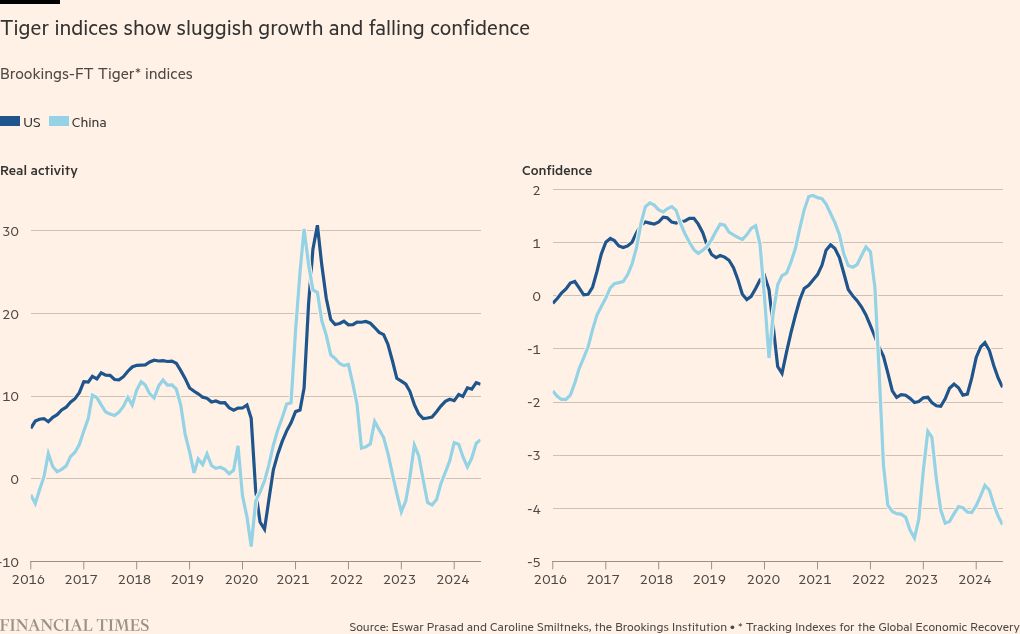Fragile confidence hinders global economic recovery

Unlock the Editor’s Digest for free
Roula Khalaf, Editor of the FT, selects her favourite stories in this weekly newsletter.
Businesses and households in major economies are struggling to bounce back from the era of high inflation as precarious growth prospects and political uncertainty weigh on their confidence.
Although economic activity remains relatively firm, confidence indicators have slid sharply or remain stuck in negative territory, according to research for the Financial Times.
The findings of the Brookings-FT Tracking Indexes for the Global Economic Recovery, or Tiger, suggest that sentiment is the global economy’s weak spot.
The US presidential election on November 5 and geopolitical turmoil, including the conflict in the Middle East and Russia’s invasion of Ukraine, are all contributing to the downbeat sentiment.
“There is this sense of gloom and uncertainty,” said Eswar Prasad, senior fellow at the Brookings Institution. “Confidence indicators are doing very poorly in countries that are doing well — as well as countries that are not doing so well.”
The findings come as policymakers and economists prepare to gather for the IMF and World Bank’s annual meetings in Washington in the coming week.
Speaking ahead of the meetings, Kristalina Georgieva, the IMF’s managing director, warned the fund’s forecasts point to an “unforgiving combination of low growth and high debt — a difficult future”.
She stressed the need for governments to tackle their fraying public finances, but warned the tough economic backdrop could hobble efforts at reducing debt levels.
The IMF will next week update its global growth forecasts, after predicting a global expansion of 3.2 per cent in 2024 and 3.3 per cent in 2025 in its July report. While the world is moving past its once-in-a-generation inflationary shock, there would be a lasting legacy on household incomes given the jump in prices, Georgieva warned.
While indicators of real economic activity have risen in the US and China, confidence has taken a sharp knock and remains well below its long-term levels, the twice-yearly index suggests. Confidence has also been hit in Japan and Germany.
Prasad said the fragility of confidence indicators reflected not only anxiety about whether the recovery would last, but also political uncertainty and the shadow of “festering geopolitical instability in many hotspots”.
This came despite the fact that the US and Indian economies, in particular, are still in “high gear”, according to the index.
Indicators for other major economies — including Germany — are far less buoyant. The real activity indicator for Germany is now at its lowest since 2020, when the Covid-19 pandemic forced economies to lock down across the world, with confidence also well below its long-term level in the eurozone’s largest economy.
Germany is facing its first two-year recession since the early 2000s after the government on October 9 downgraded its 2024 growth forecast.
Some confidence levels in the UK have increased, according to the Tiger index, even as business leaders await clarity on economic policies from chancellor Rachel Reeves in her long-awaited budget on October 30.
Data visualisation by Keith Fray
#Fragile #confidence #hinders #global #economic #recovery






